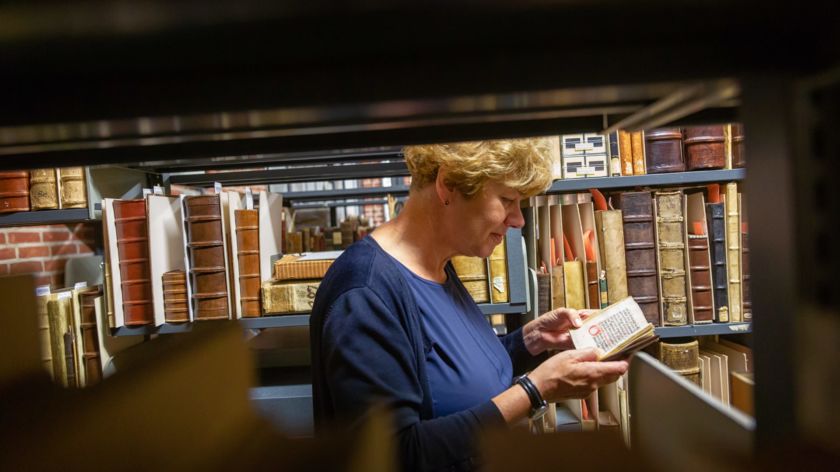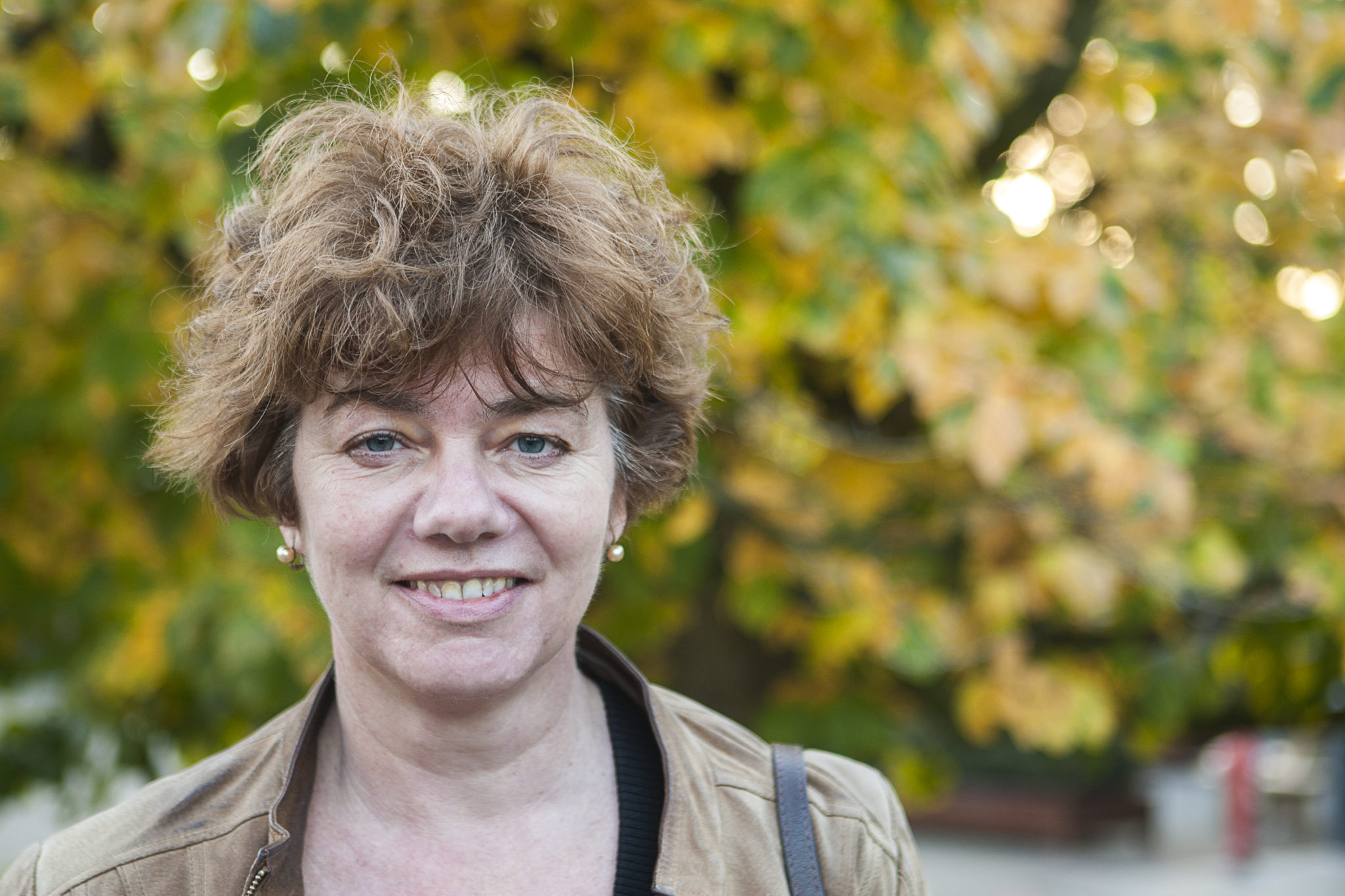Margot van Mulken steps down as dean: ‘I didn’t want to be a token woman’
-
 Margot van Mulken. Photo: Dick van Aalst
Margot van Mulken. Photo: Dick van Aalst
At the end of this month, Margot van Mulken will retire from her position as Dean of the Faculty of Arts. The Professor of International Business Communication says she performs best under pressure. ‘If the participational bodies had voted against the restructuring, I would have resigned.’
As a dean she got to know herself better, says Margot van Mulken at the start of our interview. ‘And one of the things I discovered is that I function best under high pressure.’
Since her appointment as dean in the autumn of 2014, there have been some imminent crises on the 13th floor of the Erasmus building. Especially in the months preceding the restructuring of the Faculty of Arts. The decreasing student numbers and growing work pressure meant that drastic measures were required.
Solidarity
In response, the Faculty Board came up with plans for radical innovations. The faculty’s departments were to be reduced from ten to three, and the bachelor’s programmes were to offer minors to match the needs of the labour market. In addition, a new teaching hours model was to ensure that lecturers would not devote more than 70% of their time to teaching.
‘Many people, including professors and members of participational bodies, opposed our plans,’ says Van Mulken, who as usual produces thoughtful sentences at a fast pace. From time to time, the Professor of International Business Communication stops to correct a word or sentence, not quite satisfied with her original formulation.
In the end, the participational bodies agreed to two of the three proposed changes – while asking the Faculty Board to reflect some more on their teaching hours proposal – a measure that was introduced at a later stage. But the most important changes – the minors and the restructuring of the faculty – were given the green light. ‘The Faculty of Arts was always made up of all these little islands. Previous deans who tried to change this failed. I think we managed because we didn’t just focus on the structure of the Faculty, but also on the other two aspects. In fact, the hardest part of the plan – reducing ten departments to three – ended up being the easiest in practice.’

Was that your strategy: to propose three changes, knowing they would probably not all be accepted?
‘It may look that way in retrospect, but no.’
At that famous joint assembly, tensions ran pretty high. You even put your job at stake to commit to the restructuring.
‘As a dean, if you try to change something and it doesn’t work, your reputation really takes a hit. I would have had to quit at the end of my first four-year term. Not that I would have minded terribly; it’s not as if I wouldn’t have dared show my face at the Faculty anymore had that happened.’
Is the restructuring well crystallised by now?
‘In the minors, students can join a think tank or complete an assignment with one of 35 organisations. They’re really enthusiastic about it, as are the lecturers and companies involved. We now have thirteen minors, although I expect this number to drop over time. I’m also very satisfied with our new department structure.’
‘I wouldn’t dare to say that work pressure is no longer an issue at our faculty’
Has work pressure also diminished at the Faculty of Arts?
‘As is typical for Dutch arts faculties, our lecturers tend to be so motivated that they want to teach too many courses, which also leads to high work pressure. To keep courses that attract few students viable, we’ve had to move some of them into a minor, to make them available to students from other programmes. In this way, we also tried to reduce teaching hours, and therefore the work pressure. It was an ambitious move, and I wouldn’t dare to say that work pressure is no longer an issue at our faculty. But thanks to financial injections from the Executive Board, we were able to hire 16 FTE worth over the past years. This has also helped reduce work pressure.’
The participational bodies at the Faculty of Arts were quite critical. Not satisfied with just providing input, they sometimes voted against a plan, as was the case with the teaching hours scheme. How was it to have to deal with that?
‘If they hadn’t been critical, I would have been disappointed. The participational bodies are meant to represent the entire faculty, including professors, lecturers, students, and support services. Luckily, this is the case at our faculty. I find it more difficult to deal with unorganised resistance. A number of professors were unhappy with our proposed changes. In a meeting with the professors where we, as a Board, were clearly called to account, we were able to show that our plans really did have the support of many professors. In fact, the outlines of our plan were formulated by our faculty staff, including many professors.’
‘And we did listen carefully to those who were critical of the plans. I explained that the participational bodies are the place where things can be adopted or rejected. In response, some people put themselves forward as candidates. Others took on management tasks within the new system. Which I think is absolutely fantastic.’

How does the Radboud University Executive Board look at the smaller Faulty of Arts programmes?
‘The Executive Board is aware of the importance of a high-quality Faculty of Arts. In the aftermath of the recommendations of the Van Rijn Committee (which stated that funding should shift from general to technical universities, and from humanities and social sciences to science, ed.), the Board supported us. I understand why, when you look at how many Vici, Ammodo, and ERC grants our faculty brought in these past years. Our linguistics research is number one in the Netherlands, and it was even number one worldwide in 2019. And the cultural and historical research at RICH (Radboud Institute for Culture & History, ed.) is also doing great. You’d have to be crazy to mess with that.’
‘We also want a new building on campus’
Will the Faculty of Arts also get a new building on campus?
‘We hope so. I’m really happy with the refurbished entrance of the Erasmus building, but in this building, it’s hard to spontaneously run into each other in the corridor, and this is really essential for new collaboration and initiatives. When the Faculty of Law and the Nijmegen School of Management moved to the Grotius and Elinor Ostrom buildings, they attracted hundreds of first-year students more: the building bonus. We want that too.’
But will you actually get a new building?
‘At every talk with the Executive Board, we ask whether we can pop the champagne yet, but every time they tell us it’s still in the pipeline.’
At the time of your appointment, you were the first female dean at Radboud University. Seven-and-a-half years later, only two of the seven deans are women.
‘I’m sure this disbalance will be remedied. Before becoming a dean, I used to be really irritated by measures for promoting the appointment of women. I didn’t want to be a token woman. But as a dean, I noticed that committees sometimes consist solely of men. This has got to change. When I first started at the Faculty of Arts, 40% of our professors were women; now it’s 50%. I understand that this is a luxury compared with other faculties.’
As a female executive, do you have to have a different style?
‘Maybe. I’ve noticed that Lutgarde Buydens (former Dean of the Faculty of Science, ed.) and I tend to be more resolute. We don’t hold things back and we are more direct. Maybe following the example of Wilma de Koning (former vice president, ed.), who was also quite direct in her communication.’
‘Lutgarde Buydens and I are more resolute than male deans’
‘But diversity is about more than gender alone. I find it a pity that we don’t have a richer diversity of staff, students, and administrators. I don’t mean just in terms of skin colour, but also whether someone comes from an academic background or not, or whether they are an introvert or an extrovert. But that’s a job for my successor.’
Someone at the faculty described you as having a decisive, slightly ironic style.
‘Many people think I’m really decisive, or even monomaniacal. The reality is quite different: when facing a large group, I’m absolutely terrified. But the fact that people notice that I tend to put things in perspective, and call this ‘irony’, I take that as a great compliment.’
What will you do when you are no longer dean?
‘To begin with, nothing. For the last seven-and-a-half years, I have been ‘on’ and available 24/7, or so it felt. Once I’ve had a rest, I will work on my research. Otherwise, I don’t really have an agenda, but this has always served me well.’



